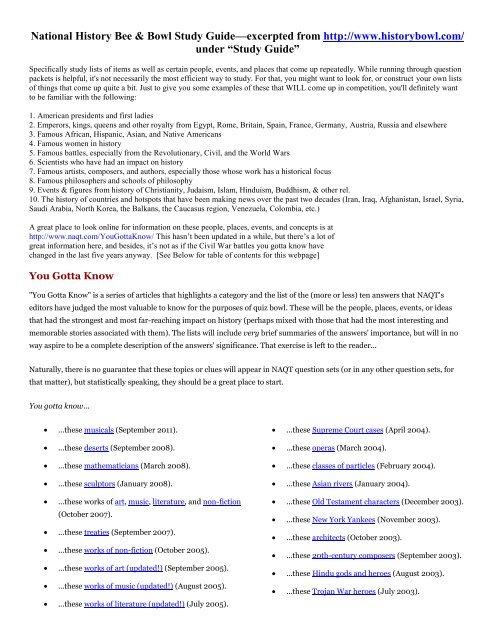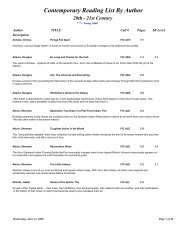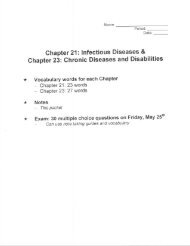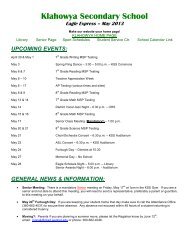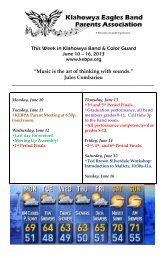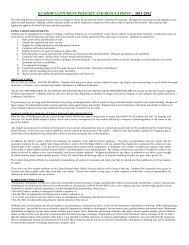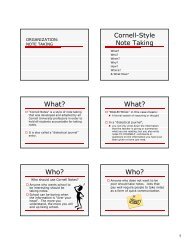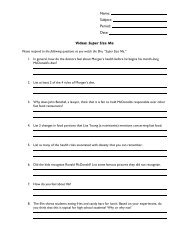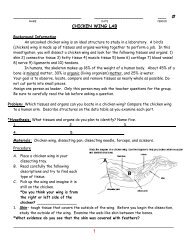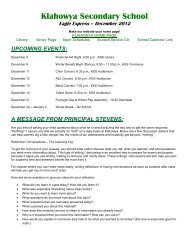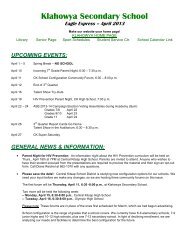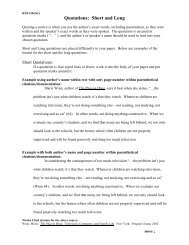National History Bee & Bowl Study Guide—excerpted from http://www
National History Bee & Bowl Study Guide—excerpted from http://www
National History Bee & Bowl Study Guide—excerpted from http://www
- No tags were found...
You also want an ePaper? Increase the reach of your titles
YUMPU automatically turns print PDFs into web optimized ePapers that Google loves.
<strong>National</strong> <strong>History</strong> <strong>Bee</strong> & <strong>Bowl</strong> <strong>Study</strong> <strong>Guide—excerpted</strong> <strong>from</strong> <strong>http</strong>://<strong>www</strong>.historybowl.com/under “<strong>Study</strong> Guide”Specifically study lists of items as well as certain people, events, and places that come up repeatedly. While running through questionpackets is helpful, it's not necessarily the most efficient way to study. For that, you might want to look for, or construct your own listsof things that come up quite a bit. Just to give you some examples of these that WILL come up in competition, you'll definitely wantto be familiar with the following:1. American presidents and first ladies2. Emperors, kings, queens and other royalty <strong>from</strong> Egypt, Rome, Britain, Spain, France, Germany, Austria, Russia and elsewhere3. Famous African, Hispanic, Asian, and Native Americans4. Famous women in history5. Famous battles, especially <strong>from</strong> the Revolutionary, Civil, and the World Wars6. Scientists who have had an impact on history7. Famous artists, composers, and authors, especially those whose work has a historical focus8. Famous philosophers and schools of philosophy9. Events & figures <strong>from</strong> history of Christianity, Judaism, Islam, Hinduism, Buddhism, & other rel.10. The history of countries and hotspots that have been making news over the past two decades (Iran, Iraq, Afghanistan, Israel, Syria,Saudi Arabia, North Korea, the Balkans, the Caucasus region, Venezuela, Colombia, etc.)A great place to look online for information on these people, places, events, and concepts is at<strong>http</strong>://<strong>www</strong>.naqt.com/YouGottaKnow/ This hasn’t been updated in a while, but there’s a lot ofgreat information here, and besides, it’s not as if the Civil War battles you gotta know havechanged in the last five years anyway. [See Below for table of contents for this webpage]You Gotta Know"You Gotta Know" is a series of articles that highlights a category and the list of the (more or less) ten answers that NAQT'seditors have judged the most valuable to know for the purposes of quiz bowl. These will be the people, places, events, or ideasthat had the strongest and most far-reaching impact on history (perhaps mixed with those that had the most interesting andmemorable stories associated with them). The lists will include very brief summaries of the answers' importance, but will in noway aspire to be a complete description of the answers' significance. That exercise is left to the reader...Naturally, there is no guarantee that these topics or clues will appear in NAQT question sets (or in any other question sets, forthat matter), but statistically speaking, they should be a great place to start.You gotta know... ...these musicals (September 2011). ...these deserts (September 2008). ...these mathematicians (March 2008). ...these sculptors (January 2008). ...these works of art, music, literature, and non-fiction(October 2007). ...these treaties (September 2007). ...these works of non-fiction (October 2005). ...these works of art (updated!) (September 2005). ...these works of music (updated!) (August 2005). ...these works of literature (updated!) (July 2005). ...these Supreme Court cases (April 2004). ...these operas (March 2004). ...these classes of particles (February 2004). ...these Asian rivers (January 2004). ...these Old Testament characters (December 2003). ...these New York Yankees (November 2003). ...these architects (October 2003). ...these 20th-century composers (September 2003). ...these Hindu gods and heroes (August 2003). ...these Trojan War heroes (July 2003).
...these tennis players (June 2003). ...these Latin American authors (May 2003). ...these Civil War battles (April 2003). ...these footballers (soccer players) (October 2000). ...these kings of France (September 2000). ...these economists (August 2000). ...these Jewish holidays (March 2003)....these types of computation problems (February2003). ...these quintuples (January 2003). ...these Olympics (December 2002). ...these programming languages (November 2002). ...these works of music (October 2002). ...these American warships (September 2002). ...these common mistakes (part 2) (August 2002). ...these religious texts (July 2002). ...these British monarchs (June 2002). ...these Norse gods and goddesses (May 2002). ...these medieval Islamic dynasties (April 2002). ...these animal phyla (March 2002). ...these common mistakes (February 2002). ...these American plays (January 2002). ...these world leaders (December 2001). ...these golfers (November 2001). ...these Russian tsars (October 2001). ...these works of art (September 2001). ...these psychologists (August 2001). ...these works of literature (July 2001). ...these 20th-century paintings (June 2001). ...these elections (May 2001). ...these planetary moons (April 2001). ...these Egyptian deities (March 2001). ...these Japanese authors (February 2001). ...these Hockey Hall of Famers (January 2001). ...these Revolutionary War generals (December 2000). ...these organelles (November 2000).
Who should study?One effective way to form a <strong>History</strong> <strong>Bowl</strong> team might be to split up the various eras in history among your teammembers. Roughly speaking, with a team of four, you could have one person focus on American history until1900, one person focus on American history since 1900, one person focus on World <strong>History</strong> to 1648, and oneperson focus on World <strong>History</strong> since 1648. Or, just divvy it up according to who is taking which history coursein school this year. A team with someone taking World <strong>History</strong> AP, European <strong>History</strong> AP, US <strong>History</strong> AP, andArt <strong>History</strong> AP is likely to be more effective than a team with everyone studying the same material.Of course, for the <strong>History</strong> <strong>Bee</strong>, you're on your own, so you may wish to prepare across all eras in any case.Keep in mind that even a little bit of preparation could make the difference as to whether you qualify for theState <strong>Bee</strong>, qualify for the <strong>National</strong> Finals, or even emerge as the <strong>National</strong> Champion. Particularly at the higherlevels of the competition, we know that most students will be studying, so keep that in mind.But moreover, you might use the <strong>History</strong> <strong>Bee</strong> and <strong>Bowl</strong> as an opportunity to learn about an aspect ofhistory that you never encountered in class, but might be interested in. Never took Art <strong>History</strong>? Spend a fewhours online learning about Giotto, Picasso, and flying buttresses. Always wanted to go to Australia but nevergot Down Under in your history classes? You might want to learn about the gunslinger Ned Kelly and thebombing of Darwin. Do you keep hearing about Chechnya, Kosovo, and Iran in the news, but never heard themmentioned once in school? Well, you're not alone, but there's going to be a good amount of "21st Century<strong>History</strong>" at all levels of the <strong>National</strong> <strong>History</strong> <strong>Bee</strong> and <strong>Bowl</strong>. We won't ask you to name every mullah in Qom,but you ought to know the difference between Ayatollah Khomeini and Ayatollah Khamenei.Why study?Because you want to get smarter. Because you want to have fun and explore your world. Because you want toimpress your coach and your teammates. Because one day you will: Finish the Saturday New York TimesCrossword Puzzle/Impress your significant other/Show up some snotty person who thinks American kids are upto no good with what you’ve learned while studying. Because you’re going to win big on a quiz show one day.Because you want to improve your grades in history classes and set yourself up for 800’s on SAT subject testsand 5s on your APs. Because you are going through spelling and geography bee withdrawal. Because you wantto improve your quiz bowl game.But most of all, if you’re like the Executive Director: Because you want to win. David Madden, the<strong>National</strong> Executive Director, was a 19 Day champion on Jeopardy.You can approach this with a “wing it” attitude, simply going with what you already know. However, there areindeed 4 state championships on the line—<strong>History</strong> <strong>Bee</strong> Varsity and JV and <strong>History</strong> <strong>Bowl</strong> Varsity & JV. In2011, KSS students placed 1 st , 1 st , 4 th , & 2 nd respectively in those competitions. This years’ competition will belarger with much more competition—each subsequent year will only grow more competitive. Now is the timeto prepare to compete. Many schools who will be competing in 2012 are just finding out about the competition.You have a head start. Take advantage of that and study.Form your <strong>Bowl</strong> teams now and begin dividing up the topics. Prepare for the <strong>Bee</strong> by studying all of the areas.You have until Feb. 18 th until the State Championships at KSS (for all students) or until March 5 th at KSS forthe Regional Championships (for our Middle School Champion & Runner-up).


